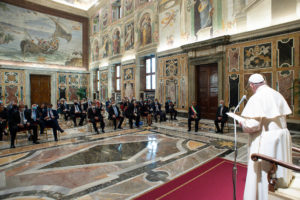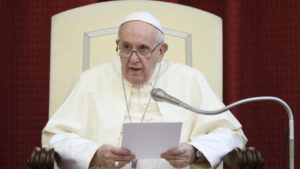When facing complex migration phenomenon, Pope Francis says we must act together, not alone…
He stressed this when receiving a delegation today, Sept. 10, from ‘Snapshots From the Borders’ in the Vatican.
Snapshots From The Borders is a 3-year project co-funded by the European Union, run by 35 partners, border Local Authorities and Civil Society organisations.
According to its website, the project aims «to improve the critical understanding of European, national and local decision makers and of public opinion about global interdependencies determining migration flows towards European borders, in the perspective of reaching SDGs targets…»
«Specifically,» it continues, «the project intends to strengthen a new horizontal, active network among cities directly facing migration flows at EU borders, as a way to promote more effective policy coherence at all levels (European, national, local).»
In his remarks, the Pope encouraged their work, stressing “the current migration scenario is complex and often has dramatic implications.”
 «No one,» he added, «can remain indifferent to the human tragedies that continue to occur in different regions of the world.»
«No one,» he added, «can remain indifferent to the human tragedies that continue to occur in different regions of the world.»
The Pope called for «concrete solidarity and shared responsibility.»
«We must act together, not alone,» he stressed.
Below is a ZENIT working translation of the Pope’s address:
***
The Holy Father’s Address
Dear Sisters and Brothers,
I welcome you who have adhered to the “Snapshots from the Borders” project. I thank Mr Salvatore Martello, Mayor of Lampedusa and Linosa, for the words he addressed to me in the name of all. And I am also grateful for this beautiful cross, so significant, which you have brought. Thank you.
Yours is a far-sighted project. It proposes to promote a more profound understanding of migration, which will enable European societies to give a more human and coordinated response to the challenges of contemporary migrations. The network of local authorities and organizations of the civil society, which was born from this project, aims to contribute positively to the development of migratory policies that respond to this end.
The present migratory scenario is complex and often presents dramatic implications. The global inter-dependencies, which determine the migratory flows, are to be studied and understood better. The challenges are multiple and question everyone. No one can remain indifferent to the human tragedies that continue to be consummated in different regions of the world. Among these we are often questioned by those that have the Mediterranean as theatre, a sea of borders, but also of the meeting of cultures.
Last February, during the — very positive — Meeting at Bari with Bishops of the Mediterranean, I recalled how “among those in the Mediterranean area that struggle most, are those fleeing from war or leaving their land in search of a life worthy of man. [. . .] We are aware that in diverse social contexts a sense of indifference and even of rejection has spread [. . .] The International Community has halted military interventions, whereas it should build institutions that guarantee equal opportunities and places in which citizens have the possibility to take charge of the common good [. . . ] At the same time, we do not accept that one who seeks hope by sea should die without receiving aid [. . . ] Certainly, hospitality and a fitting integration are stages of a process that is not easy; however, it’s unthinkable to be able to address it by erecting walls” (Address, February 23, 2020).
In face of this challenge, it seems evident that concrete solidarity and shared responsibility are indispensable, at the national as well as the international level. “The present pandemic has made our interdependence evident: we are all connected with one another, be it in evil or in good” (General Audience, September 2, 2020). It’s necessary to act together, not on our own.
It is also essential to change the way of seeing and recounting migration: it’s about putting persons, faces and stories at the center. Behold, then, the importance of projects, such as that promoted by you, which seek to propose different approaches, inspired by the culture of encounter, which is the path to a new humanism. And when I say “new humanism,” I don’t intend it only as a philosophy of life, but also as spirituality, as a style of behaviour.
The inhabitants of cities and border territories — the societies, the communities, the Churches — are called to be the first actors of this turning point, thanks to the continuous opportunities of encounter that history offers them. Borders, ever considered as barriers of division, can become, instead, “windows,” areas of mutual knowledge, of reciprocal enrichment, of communion in diversity; they can become places in which models are experienced to overcome the difficulties that the new arrivals entail for the indigenous communities.
I encourage you to continue to work together for the culture of encounter and of solidarity. May the Lord bless your efforts in this connection, and Our Lady protect you and the people for whom you work. I pray for you and you, please, don’t forget to pray for me. May the Lord bless you all, your work and your efforts to go forward in this sense. Thank you.
[Original text: Italian] [ZENIT’s translation by Virginia M. Forrester]


